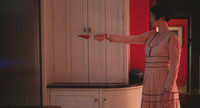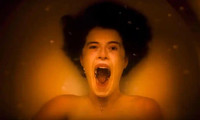Women should be happy they have only one real problem in life. Unfortunately, that problem is men, of whom there are so many. As more than a few ladies have noted over the millennia, any female attempting to fend off unwanted male attention can expect one of two outcomes. The first would involve a philosophical shrug as the suitor moved on to annoy somebody else. The second would have him lurking nearby to rape and kill her. This last is a possibility that can never be forgotten for even a moment.
In his new movie "Men," writer-director Alex Garland, who previously kicked the tires of traditional sci-fi tropes in "Ex Machina," "Annihilation" and the FX miniseries "Devs," examines the eternal gender stalemate in a way that is fairly brilliant, entirely strange, and only slightly ridiculous. In its five-alarm body-horror ending, the picture is also pretty frickin' scary.
Standing in for all women — well, a whole lot of them, anyway — is Jessie Buckley, whom you may recall also having a major guy problem in Charlie Kaufman's "I'm Thinking of Ending Things" (2020). Buckley plays Harper, a London-based Brit in desperate need of a getaway. Harper's problem is her unstable husband, James (Paapa Essiedu), who is an abusive jerk — or was: she last locked eyes with him as he plummeted past their apartment window on his way down toward the spiky finials of a wrought-iron fence many stories below. Now, newly widowed, she's taken a two-week lease on a luxurious country manor in search of chill. No such luck, of course.
The soggy woodlands around Harper's manor are well-stocked with irritating men — the property's owner, a toothy gent named Geoffrey; a quietly insufferable vicar; a foul-mouthed teenager; an arrogant constable, and a naked guy with thorns poking through his skin (who's not even the worst of them). It was an inspired choice on Garland's part to have each of these characters played by the same actor, Rory Kinnear (of "Penny Dreadful" and the Craig-era Bond films, in which he played Bill Tanner). And it's a triumph for Kinnear that he has managed to divide them cleanly into different types of awful. Geoffrey's specialty is a passive-aggressive ambiguity that leaves Harper uncomfortably weirded out. ("Do watch what you flush," he says, pointing out a bathroom). And after she tells the faux-kindly vicar that her late husband punched her in the face, he asks, "Why did you drive him to it?"
At least the naked guy doesn't speak. We already recognize him, anyway, as a descendant of the eerie blossoming corpses in "Annihilation." Garland introduces this Yeatsian creature in one of the movie's most lyrical passages, positioning him at the far end of a long country tunnel that Harper has filled with looping vocal echoes, then having him suddenly charge toward her with unguessable intent. When he keeps reappearing, one of the local cops tells her the man is "harmless," but she's got their number by then and cedes them no belief.
Garland's mastery of tension and threat may flag in a few sections of the film — you can feel energy beginning to leak — and you have to snicker a bit when its sexual politics veer into overkill. But the director's visual gift is powerfully deployed in the bloody allusions to birth and regeneration that engorge the end of the film — a spectacular eruption of horror-dream imagery. And his script never stops scrutinizing the male-female sexual dynamic that enables so many of the world's victimizers to declare themselves the real victims.
"When did you lose your virginity?" the vicar asks Harper, out of nowhere. "I have imagined you an expert in carnality. These things now exist in my mind. This is the control you exert."
Kurt Loder is the film critic for Reason Online. To find out more about Kurt Loder and read features by other Creators Syndicate writers and cartoonists, visit the Creators Syndicate website at www.creators.com.









View Comments